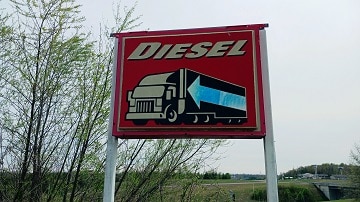If you own a diesel vehicle or have been considering purchasing one, you may have come across the term diesel exhaust fuel (DEF). Understanding the terms related to your vehicle can help you keep your engine running within federal emissions standards. Here's everything you need to know about DEF.
What Is DEF?

Almost every diesel-powered engine in the United States relies on DEF, a mix of deionized water and urea. These two substances combine to convert the harmful nitrogen oxide emissions from diesel engines into safe water and nitrogen. Many engines of generators, farm equipment, boats, and other machines also utilize DEF.
How Is DEF Used in an Engine's Exhaust?
Modern diesel vehicles have a selective catalyst reduction (SCR) system. This system, designed to reduce emissions, helps DEF interact with a diesel vehicle's engine exhaust. The SCR injects the DEF through a catalyst. It then travels into the vehicle's exhaust stream.
The DEF and exhaust gas then move to the catalytic converter, where the urea in the DEF reacts with the noxious nitrogen oxide and converts it into nitrogen, water, and a little carbon dioxide. After the chemical change, the nitrogen, water, and carbon dioxide move out of the vehicle's exhaust pipe and into the atmosphere. They're much safer for people to breathe in and less harmful to the planet than the original nitrogen oxide.
What Does DEF Do?
DEF helps trigger a chemical reaction that reduces the volume of nitrogen oxide that enters the atmosphere from diesel vehicles by up to 90%. In doing so, DEF helps keep people safe and contributes to the environmental protection of the planet.
Without DEF, people would be at increased risk of health issues caused by nitrogen oxide exposure. Low levels of nitrogen oxide can irritate your eyes, nose, throat, and lungs. You might notice it makes you cough, feel nauseous, tired, or short of breath. High levels of nitrogen oxide can cause spasms, fluid build-up in the lungs, throat and upper respiratory tract tissue swelling, and even death. Nitrogen oxide can also cause environmental problems such as pollution, haze, and acid rain.
In addition, DEF can improve a diesel vehicle's fuel efficiency by around 3% to 4%. These modest improvements mean motorists driving vehicles that use DEF spend less on gas and reduce their carbon footprints. Keeping your car topped up with enough DEF can help you enjoy these benefits.
Why Do You Need DEF?
If you own a diesel vehicle, you need DEF to make sure it doesn't emit high levels of nitrogen oxide into the atmosphere. Without DEF, your diesel vehicle would violate the federal emissions standards set by the EPA.
If you run out of DEF, your diesel vehicle may not start. The systems of most diesel vehicles won't work until there's enough DEF in the reservoir for optimal function. Other systems limit the vehicle's speed until you fill the DEF reservoir. You don't need to worry about accidentally running out, though. Most modern diesel vehicles issue warnings when their DEF reservoirs run low. Once you see the warning light, refilling your DEF reservoir as soon as it's convenient should keep your diesel efficient and reliable.
While roughly two-thirds of DEF is water, plain water isn't a substitute for DEF. It doesn't have the necessary chemical composition to convert nitrogen oxide to safer elements as DEF does. Most diesel vehicles have smart technology to recognize DEF. If you refilled the DEF reservoir with water, it would reject the water as a poor-quality DEF and refuse to start.
How Much DEF Do You Need?
Diesel vehicles need different amounts of DEF, depending on their engines and tank sizes. A 2010 study suggested most people use around 1% to 3% as much DEF as diesel fuel. In other words, a truck that gets 20 mpg could travel around 1,000 miles for every gallon of DEF. In the best-case scenario, they might fill their 5-gallon DEF reservoir every 5,000 miles. However, a truck that does a lot of towing might use much more.
Rather than letting it run dry, pay attention to the warnings and refill the reservoir when you notice a few inches of DEF left to ensure you always have enough DEF to reduce nitrogen oxide emissions effectively.
How Often Do You Need To Refill Your DEF Reservoir?
In most cases, you'll need to refill your DEF reservoir as often as you change your oil. In other words, most people refill their DEF reservoir every three months, depending on their vehicle and how often they drive it. Many people refill their DEF reservoir when they get an oil change as part of their maintenance routine.
How Do You Buy and Store DEF?
Wholesale suppliers offer the most cost-effective, high-quality DEF. Stocking up on their DEF helps ensure you have this fluid whenever your reservoir needs topping up. You can safely store DEF in a cool, dry place away from direct sunlight for up to two years. If stored under less favorable conditions, it should still last a year.
Some gas stations, auto parts stores, supermarkets, and large big box home improvement stores also sell DEF. These businesses usually sell DEF in 1-gallon jugs and 2.5-gallon cardboard boxes. You might also find DEF sold at the pump at truck stops, as large semi-trucks constantly on the road go through a lot of this fluid.
Keep Your Diesel Vehicle Running Well
Ensuring your diesel vehicle has enough DEF is just one way to keep it running well. Sticking to the maintenance schedule is another way to make sure your vehicle has everything it needs. During regular maintenance, our service team will top up most fluids, change filters, and perform standard maintenance checks to make sure your vehicle is in good health. Contact All American Chrysler Dodge Jeep Ram for service you can trust in Oneonta, Alabama. You can book an appointment with our experienced mechanics online or call us at (205) 537-8717.
Diesel by Gerry Dincher is licensed with CC BY-SA 2.0